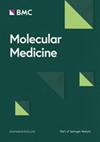ZCCHC8 p.P410A disrupts nucleocytoplasmic localization, promoting idiopathic pulmonary fibrosis and chronic obstructive pulmonary disease
IF 6
2区 医学
Q1 BIOCHEMISTRY & MOLECULAR BIOLOGY
引用次数: 0
Abstract
Idiopathic pulmonary fibrosis (IPF) is a special kind of chronic interstitial lung disease with insidious onset. Previous studies have revealed that mutations in ZCCHC8 may lead to IPF. The aim of this study is to explore the ZCCHC8 mutations in Chinese IPF patients. Here, we enrolled 124 patients with interstitial lung disease from 2017 to 2023 in our hospital. Whole exome sequencing and Sanger sequencing were employed to explore the genetic lesions of these patients. Among these 124 patients, a novel mutation (NM_017612: c.1228 C > G/p.P410A) of Zinc Finger CCHC-Type Containing 8 (ZCCHC8)was identified in a family with IPF and chronic obstructive lung disease. As a component of the nuclear exosome-targeting complex that regulates the turnover of human telomerase RNA, ZCCHC8 mutations have been reported may lead to IPF in European population and American population. Functional study confirmed that the novel mutation can disrupt the nucleocytoplasmic localization of ZCCHC8, which further decreased the expression of DKC1 and RTEL1, and finally reduced the length of telomere and led to IPF and related disorders. We may first report the ZCCHC8 mutation in Asian population with IPF. Our study broadens the mutation, phenotype, and population spectrum of ZCCHC8 deficiency.ZCCHC8 p.P410A 会破坏核胞质定位,促进特发性肺纤维化和慢性阻塞性肺病的发生
特发性肺纤维化(IPF)是一种特殊的慢性间质性肺病,起病隐匿。以往的研究显示,ZCCHC8基因突变可能导致IPF。本研究旨在探讨中国 IPF 患者的 ZCCHC8 基因突变情况。在此,我们纳入了2017年至2023年在我院就诊的124例间质性肺疾病患者。采用全外显子组测序和Sanger测序方法探讨这些患者的基因病变。在这124名患者中,在一个患有IPF和慢性阻塞性肺病的家族中发现了锌指CCHC型含8(ZCCHC8)的新型突变(NM_017612:c.1228 C > G/p.P410A)。作为调节人类端粒酶 RNA 更替的核外泌体靶向复合物的一个组成部分,ZCCHC8 基因突变可能导致欧洲和美国人群中的 IPF。功能研究证实,新型突变可破坏ZCCHC8的核胞质定位,进一步降低DKC1和RTEL1的表达,最终导致端粒长度减少,引发IPF及相关疾病。我们可能是首次报道亚洲人群中的IPF患者存在ZCCHC8突变。我们的研究扩大了ZCCHC8缺乏症的突变、表型和人群范围。
本文章由计算机程序翻译,如有差异,请以英文原文为准。
求助全文
约1分钟内获得全文
求助全文
来源期刊

Molecular Medicine
医学-生化与分子生物学
CiteScore
8.60
自引率
0.00%
发文量
137
审稿时长
1 months
期刊介绍:
Molecular Medicine is an open access journal that focuses on publishing recent findings related to disease pathogenesis at the molecular or physiological level. These insights can potentially contribute to the development of specific tools for disease diagnosis, treatment, or prevention. The journal considers manuscripts that present material pertinent to the genetic, molecular, or cellular underpinnings of critical physiological or disease processes. Submissions to Molecular Medicine are expected to elucidate the broader implications of the research findings for human disease and medicine in a manner that is accessible to a wide audience.
 求助内容:
求助内容: 应助结果提醒方式:
应助结果提醒方式:


